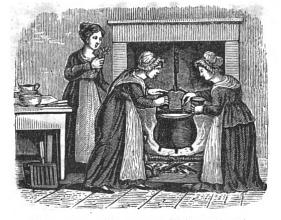

Too many Cooks spoil the Broth!
To make good broth how busy all we see,
To join their skill they all as one agree:
First one into the broth the salt will throw,
Next one peppers it well, and thus they go:
To make it better still, we see a third
Puts into the seething pot some savory herb;
They stir it round and round, while hard it boils,
'Tis vain; by many cooks--the broth it spoils!
We see here a number of cooks busily engaged in making some broth which they wish to be delightful. For once, they unite their skill. One thinks that everything ought to be well salted in order to be palatable, another puts in a good deal of pepper, while another prefers to have a variety of savory herbs. Each of these cooks are careful to put in enough of their favorite ingredients--and thus the broth is cooked. When put on the table it is found to be too salty for some of the company, too high seasoned for others, etc. In short, the broth is totally spoiled!
The proverb is true in more respects than one. It is found that there are many things which will not mix well together. Where there is anything of importance to be accomplished, it is unwise to adopt parts of two or three plans which will not harmonize together. It is necessary to have one well digested plan, carried forward by one directing mind. Where several have an equal direction in public affairs, the public interest generally suffers. The plans of no one are fully followed, and the responsibility which rests upon each individual is light, as each throws the blame of a failure on others.
In works of public utility, in the fine arts, architecture, etc, it is necessary to have one controlling will in order to have the several parts harmonize with each other. In constructing a house, one master builder is better than three. In the fine art of painting, two painters on one picture would make patchwork, and in architecture, if more than one mind directs, the harmony of the several parts is usually destroyed, and even if the architect attempts a combination of the several orders of architecture, it is thought by many that it cannot be otherwise than a failure.